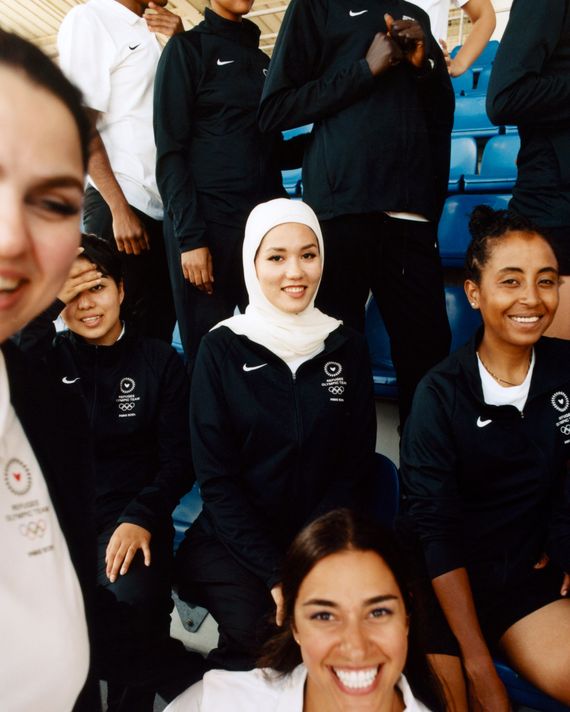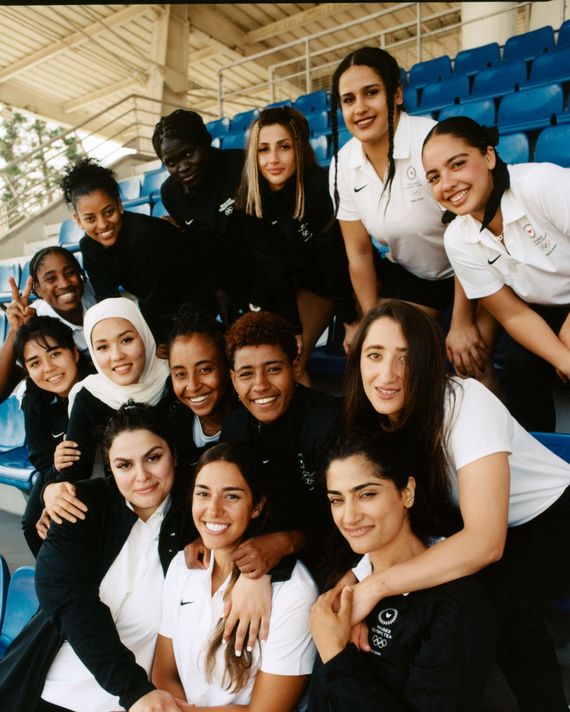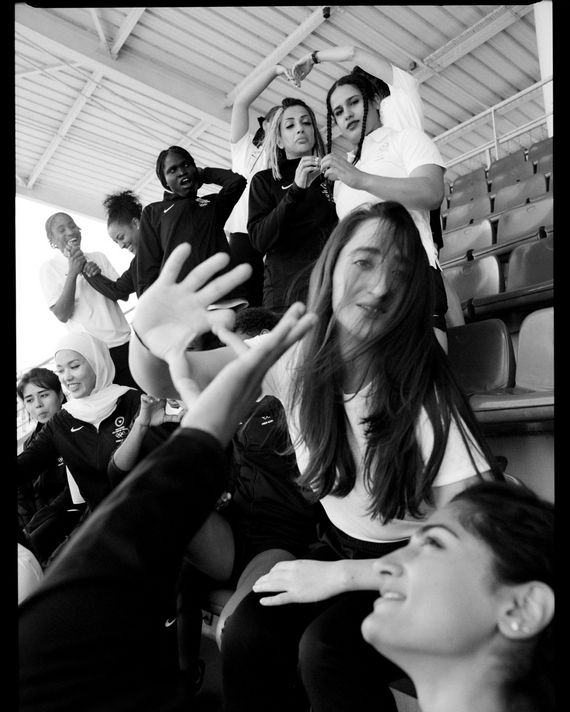
This article was featured in One Great Story, New York’s reading recommendation newsletter. Sign up here to get it nightly.
For any athlete, the Olympic Games are all about achieving what looks impossible. With knifelike focus, competitors often spend a lifetime climbing toward this goal. They hammer out grueling training schedules and exacting diets, make invisible-to-us sacrifices, and overcome injuries so that they can sprint faster, swim longer, and push harder than most people watching at home can imagine. The path to qualifying for the Games — let alone mounting the podium — is always narrow. But for the 37 athletes (including the 13 women pictured throughout) who make up the Refugee Olympic Team, those odds are stunningly slim. And their goal is so much bigger than a medal.
In the past decade, a confluence of violent conflicts — in Ukraine, in Afghanistan, in Syria, in Sudan, in Palestine and beyond — have forced roughly 120 million people from their homes, driving them to seek asylum in foreign countries. The crisis has come coupled with spiking xenophobia and hostility toward immigrants, particularly across Europe and in the United States. Over the next two and a half weeks in Paris, the task of the Refugee Team will extend beyond athleticism and personal achievement. Its purpose, according to Jojo Ferris, head of the Olympic Refuge Foundation (ORF), “is to really reach the hearts and minds of the public.” It’s to challenge “the negative rhetoric around refugees in communities or cultures,” Ferris continues, and to remind viewers what people are capable of — just how much they can contribute — when they receive the requisite support.
“Most refugees, they have a lot of potential and a lot of objectives, dreams,” says Masomah Ali Zada, a 28-year-old Tokyo 2020 cycling alumna originally from Afghanistan and this year’s team leader and representative. “But because they have left their country, lost everything, and left everything behind, they cannot go ahead.” Originally from Afghanistan, Ali Zada spent her early years in exile in Iran after the Taliban took control of her village when she was about 2 years old. Denied asylum, she explains, her family “didn’t have the right to go to school or to work or to rent a house,” at least not through official channels. Though she returned to Afghanistan as an 11-year-old, her family left again in 2017 as the Taliban prepared to reclaim power. When she resettled in France, any aspirations of competitive cycling felt “impossible, just a dream in my head,” she says. And yet, ahead of the Tokyo Olympics, Ali Zada became the first refugee in France to receive an IOC Refugee Athlete Scholarship. Now, she wants the team to serve as a reminder of resilience, not just to her fellow athletes but to all refugees: “The members of the Refugee Olympic Team, they did it. They realized their dream, they worked hard.” The message to those watching: “You can also do that.”
The Refugee Olympic Team has been a fixture at the Opening Ceremony since the 2016 Games in Rio de Janeiro, for which the International Olympic Committee selected ten athletes from four countries. IOC President Thomas Bach said at the time that the organization aimed to underscore the magnitude of a growing migrant crisis, which had then displaced around 65 million people globally. He said the IOC also wanted to provide a pathway to competition for refugee athletes who lacked official statehood and were barred from competing under their home countries’ flags. At the Tokyo Olympics in 2021, the team’s ranks grew to 29 athletes and have continued to expand with the world’s refugee population.
As you might expect, bringing the team together presents a special challenge. For the Refugee Team, the ORF functions basically as a national Olympic committee, the body that would, in any other context, be responsible for selecting and entering each country’s athletes for the Olympics. Ahead of the Games, the organization awards scholarships to support refugee competitors’ training and, if they qualify for the Olympics, their participation. In the run-up to July 26, when the Opening Ceremony kicks off in Paris, they have been coordinating visas, travel documents, athlete accreditation, and transportation; last week, they also helped coordinate a training camp in Bayeux, a Normandy town about three hours outside of Paris, adjacent to the beaches where allied troops landed on D-Day in 1944. Organizers leaned on the symbolism of the setting to drive home the team’s animating message — hope and solidarity — as well as the emotion of the moment to flash-bond the team. The “athletes speak multiple languages,” says Ferris. They come from 11 different countries. “They have different backgrounds and really very different journeys.” But they all share that same “certain sense of pride,” she says. “They know that people are watching and get inspired.”
So far, the team hasn’t accrued any medals, though Muna Dahouk — a judoka originally from Syria who first competed in Tokyo — is hopeful that could change this year. But even if it doesn’t, “it is so important to me to show the world what refugees can do. We are strong, we are the same as other athletes,” Dahouk, 28, says. “It’s true that we came from hard conditions and from bad situations. Even then, we are still standing on our own legs and we can fight.”
It was Dahouk’s late father, a judo instructor, who introduced her to the martial arts when she was 6 years old. “My first steps were on the mat, on the tatami,” she says. But a civil war in her country put an end to her practice for nine years. After her father died, her mother feared for the family’s safety, moving them piecemeal to the Netherlands. Dahouk and her sister spent two years alone in Syria, waiting to join their mother and brother. When she first arrived in the Netherlands in 2019, “judo wasn’t in the plan,” Dahouk recalls. She had other preoccupations: school, a new language, a new culture. Family friends — fellow refugees from the judo scene in Syria — drew Dahouk and her sister back into the sport. “In the beginning, it was so hard,” she says. The Dutch members of her local club operated at a much higher level and Dahouk felt discouraged, angry: If it hadn’t been for the war, she thought, she would have kept practicing; she would’ve been just as skilled as her teammates. But she kept working at it, eventually gaining the support of the International Judo Federation, before qualifying for Tokyo — and winning a spot on the Refugee Team — in 2021. That moment was “magical,” she says. “I spent two hours telling my coach, ‘Please pinch me.’”
Though Dahouk’s time on the mat was ultimately brief — she lost to her opponent in a 38-second match — she still says the experience “was like a dream; everything was perfect.” In Tokyo, Dahouk got to practice her art in Japan’s Nippon Budokan, the site of the first Olympic judo competition. She also made a best friend: Nigara Shaheen, a 29-year-old judoka originally from Afghanistan who grew up primarily in Pakistan. “I always say I became a refugee two times,” Shaheen explains. When she was 6 months old, Shaheen’s parents left their home with just a backpack, carrying her over the mountains into Pakistan on foot to escape the ongoing civil war. They spent the following year with a relative in Peshawar, living with some 20 people in a single room before they managed to get an apartment of their own. As a child, Shaheen says she loved wrestling and Dwayne “The Rock” Johnson; from an early age, she also wanted to be able to defend herself against the men who would harass her as she walked to school each morning. On one occasion, when she tried to stand up for herself, the man targeting her “just pushed me and I fell down in the street.” At 11, she started judo, training with a group of local girls. About seven years later, when she returned to Afghanistan for university, her only option was to train alongside the men on the country’s national team. Despite the country’s post-Taliban softening on women’s rights, Afghan society remained heavily patriarchal; men and women wrestling together read as a modesty violation. Still, she says, “I knew in myself from the beginning that what I was doing was not wrong.” Inside her dojo, she never faced discrimination over her gender, and her goal became to set an example for other Afghan girls.
At 25, she moved to Russia for a master’s program and continued her training there. When none of the other students in the gym would partner with her, she trained by herself, eventually catching the eye of the International Judo Federation, which recommended her for the Refugee Team. Her debut in Tokyo — cut short by a shoulder injury — triggered a fresh wave of harassment after she appeared in competition without her hijab. “It was not only people in Afghanistan,” she says, “it was people all over the world; they were coming and judging me.” Because the Taliban had returned to power in 2021, Shaheen returned to Pakistan after the Games rather than Afghanistan. Even there, though, she was too scared to tell people she was an Olympian. “I used to hide it wherever I’d go. It was the biggest achievement of my life, and I had to hide it.”
But through the Olympics, Shaheen says she acquired a “sister” in Dahouk, and, ultimately, her “judo family” in Canada, where she resettled thanks to a partnership program between the ORF, U.N. Refugee Agency, and the World University Service of Canada. She’s one of several Refugee Team alumni who’ve benefited from the program, according to Ferris. Four others have received citizenship from their host countries. The attention that comes with an Olympic platform can translate to concrete opportunities off the field, Ferris notes, while at the same time, “sport can provide both a way to initially integrate and find belonging in their new country.”
That was the case for Saman Soltani, 28, a competitive kayaker and swimmer originally from Iran. When she arrived in Vienna in 2022, the visit wasn’t planned. Soltani was on her way back to Iran after attending a swim camp in Spain when she received a call warning her not to return. Soltani had posted several photos to her Instagram account in which she wasn’t wearing her hijab; suddenly, she found her safety in jeopardy. She called the only person she knew in Europe, an Austrian man whom she’d befriended in Iran several years prior. “I was panicked and I didn’t really know what was happening,” Soltani recalls. She accepted his invitation to hide out in Austria, a temporary solution that eventually turned permanent as Soltani sought asylum. For her first few months, she wasn’t thinking about sports at all. “I had nightmares every night that someone comes and wants to force me back,” she says. “I was crying at night, I was shouting, my blanket and my pillow were wet when I woke up.” What lifted her out of it was kayaking, something she picked up again after her host bought her a paddle and a watch. In the beginning, “I was not even able to paddle for two minutes,” Soltani says. “I lost my power, my endurance … I gained ten kilos, and so it was really, really hard. But then that was the only time when I felt free, I felt safe, I felt good. It was like therapy for me.”
This month, Soltani will compete in her first Olympics, as a canoe sprinter. Her inaugural Opening Ceremony will look a little different than in years past: Not only will athletes parade through Paris in boats on the Seine, but her team will also enter under a new flag. The Refugee Team’s emblem features a heart at its center, a design that underscores the team’s mission: “peace and hope and reunification,” as chef de mission Ali Zada explains it. “We are from different nationalities and languages, and we are from different cultures, but we make a team. It shows that we can all together live in peace by accepting our differences,” she says. “Why not other countries?”
More of the cut's olympics coverage
- An Olympic Runner Is Dead After Brutal Attack
- Raygun Apologizes to the Breaking Community
- Why Ilona Maher Wears Lipstick While Playing Rugby







